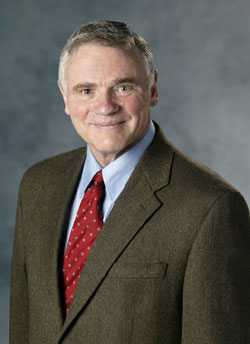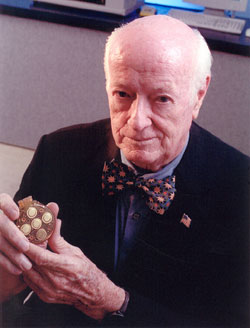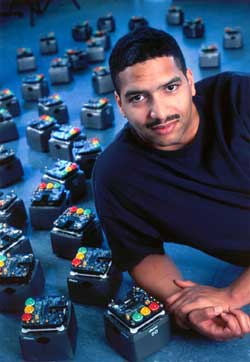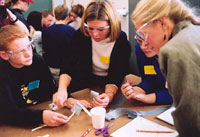Lemelson–MIT Program
The Lemelson-MIT Program is administered within the School of Engineering by the director Merton Flemings, Toyota professor emeritus of materials processing, and the executive director, Kristin Finn. The mission of the program is to raise the stature of inventors and innovators and foster invention and innovation among young people.
Each year, the Lemelson-MIT Program awards a series of prizes recognizing outstanding achievement in invention and innovation. Awards include the $500,000 Lemelson-MIT Prize, the $100,000 Lemelson-MIT Lifetime Achievement Award, and the $30,000 Lemelson-MIT Student Prize. Additionally, a new grants program was launched this year to support high school teams working on inventions to benefit their schools or communities.
The program also sponsors ongoing public education and informational activities designed to raise awareness about the importance of invention to the American economy. These include Inventing Modern America: From the Microwave to the Mouse, a book profiling the life and work of 35 prominent inventors; a web site at http://web.mit.edu/invent/, a clearinghouse for information on inventors and inventing; The Invention Index, an annual survey of Americans' perceptions about invention; and Inventory, a biannual newsletter promoting inventive creativity.
Annual Invention Awards
The $500,000 Lemelson–MIT Prize
 Dr. Leroy E. Hood, winner of the 2003 Lemelson-MIT Prize |
Presented to an outstanding living American inventor-innovator who has significantly benefited society, the Lemelson-MIT Prize is the program's most prestigious and visible vehicle for creating excitement about invention and innovation. Called "the equivalent of the Oscars for inventors" by CNN, the prize is the world's largest single award for invention and innovation.
This year's prize recipient, Dr. Leroy E. Hood, was announced in Boston on April 24. Hood was recognized for a number of inventions, most notably the automated DNA sequencer that enabled the Human Genome Project. President and cofounder of the Institute for Systems Biology and a pioneer in genomics, Hood also invented a powerful device for sequencing proteins, a machine for synthesizing proteins, and an automated tool for synthesizing DNA. His vision and inventions have permanently changed the course of biology and revolutionized the understanding of genetics and human health.
Representatives from industry, academia, government, and the media attended the black-tie presentation ceremony at the John F. Kennedy Museum and Library. MIT president Charles Vest welcomed guests and Dean Thomas Magnanti presented the prize.
The $100,000 Lemelson–MIT Lifetime Achievement Award
 Dr William P. Murphy, Jr., winner of the 2003 Lemelson-MIT Lifetime Achievement Award |
Previously an honorary award, the Lemelson–MIT Lifetime Achievement Award carried a cash prize for the first time this year. It honors a remarkable individual for his or her life-long commitment to improving society through invention.
Dr. William P. Murphy Jr. was named this year's Lifetime Achievement Award winner at the ceremony on April 24 at the John F. Kennedy Museum and Library. He was lauded for his outstanding contributions in advancing medical technology and diagnostic instruments. A pioneer in the application of engineering to medicine, Murphy holds 17 patents for inventions, ranging from the first disposable medical procedural trays and blood bags to the first physiologic pacemaker and hollow-fiber artificial kidney.
The $30,000 Lemelson–MIT Student Prize
 James D. McLurkin, winner of the Lemelson-MIT Student Prize |
Awarded to an MIT student for remarkable inventiveness, the Lemelson-MIT Student Prize recognizes a talented early career inventor and positive young role model. This year's recipient, James D. McLurkin, upheld the strong tradition of exceptional Student Prize winners. A 30-year-old MIT graduate student in computer science, McLurkin was honored at a press conference on February 26 at the Museum of Science, Boston. He won the student prize for his pioneering fleet of microrobots—the world's largest swarm of small autonomous robots that can work cooperatively to accomplish real-world tasks.
A native of Baldwin, NY, and a Lemelson minority engineering fellow, McLurkin earned his bachelor's degree from MIT and his master's degree from the University of California at Berkeley. He has taught civil engineering to 10th graders at MIT's Saturday Engineering Enrichment and Discovery Academy, a program designed to help prepare urban students for college.
Outreach Activities and Events
InvenTeam Grants
Intent on aligning our program activities closer to our mission of inspiring young inventors, we launched our InvenTeam Grants program for high school invention teams in academic year 2003. The program is designed to engage secondary students in the invention process and to generate excitement about the rewarding process of identifying a need in their school or community, brainstorming on a solution, and working through the inventive process to produce something beneficial to others.
 Recipients of a 2003 Lemelson-MIT InvenTeam Grant at a kick-off workshop at MIT, November 2003 |
In the program's pilot phase, we awarded three grants of $10,000 each to public high school teams in rural New England. The teams, composed of 59 students and 13 teachers and mentors, worked on their projects for six months. Inaugural grant recipients and their invention projects were Littleton, NH, High School—a snow-melting system for town streets and sidewalks; Bow, NH, High School—a glare-reduction device; and Smith Academy (a Hatfield, MA, public school)—a solar-powered house lamp. In November, all three teams attended a daylong workshop at MIT that helped them start off on the right footing. After six months of hard work on their invention projects, the teams returned to MIT for final presentations on May 21.
The program this year featured a new InvenTeam web site, a robust source of information for teams on inventing, and an important reporting and communications tool to support their work.
We are gearing up to expand the program nationally in 2003–2004 and expect to award at least 10 grants of up to $10,000 each to schools that represent different regions of the country as well as diverse school populations. Our outreach to science educators was extensive and included brochure mailings, emails, leaflets at conferences, and ads in journals for educators. The MIT admissions office helped us reach schools that are strong sources of minority and regular applicants. Our efforts garnered a substantial number of applications.
Preliminary applications were evaluated in May. Twenty-five semifinalists from all over the country, including nine inner-city public high schools, were notified in June. They will be invited to submit final applications by September 24. Grant recipients will be announced October 16, 2003. To bolster our efforts to develop a top-notch high school program, we are hiring a full-time grants officer for the 2003–2004 cycle.
The Invention Study: Assembly and Workshops
A series of workshops is being held during calendar year 2003, culminating in an "Invention Assembly" to be held in Washington, DC, on April 23, 2004, at the National Academy. The overall study (assembly plus workshops) is concerned with understanding invention and inventiveness, the impact of invention on society, stimulating inventiveness in young people, and with how creativity in invention relates to that in other areas of endeavor. The workshops and the assembly comprise gatherings of inventors and intellectual leaders in a wide range of disciplines.
The proposed workshops and assembly have two basic goals: through a scholarly, interdisciplinary approach to the subject, to shed new light on invention and on the special kind of creativity involved in inventing; and to develop specific findings and recommendations of value to policy makers in their efforts to enhance the climate for invention and the value of inventions to society and to encourage inventiveness in young people.
The study has received support from the National Science Foundation, and the Invention Assembly will be hosted by the National Academy of Engineering. The assembly will be held in conjunction with the 10th Annual Award Ceremony of the Lemelson-MIT Program.
We held our first workshop—"Historical Perspectives on Invention and Creativity"—at MIT on March 14–16. Led by prominent MIT historian Merritt Roe Smith and by Mert Flemings, the workshop attracted 11 leading science and technology scholars and authors, including several from MIT, for a weekend of presentations and discussion. A report on the workshop highlighted findings that will provide thoughtful perspectives for discussion at the 2004 assembly.
Four additional workshops, modeled on the first, are scheduled before the end of 2003. Among them will be a session on invention and education chaired by Christopher Magee, director of MIT's Center for Innovation in Product Development.
MIT IDEAS Competition
For the second year, we were pleased to support the MIT Innovation, Development, Enterprise, Action, and Service (IDEAS) Competition, organized by former Lemelson–MIT Student Prize winner Amy Smith and MIT's Public Service Center. The competition is designed to support innovative student projects that address community needs locally, nationally, or internationally.
As part of the competition, the Lemelson-MIT Program offers $10,000 in International Technology Prizes for the best technological innovations for developing countries. This year, the top $5,000 prize went to the Kinkajou Project, a low-cost microfilm projector and learning tool for classrooms with limited resources. Developed in Professors Woodie Flowers and David Wallace's senior-year class, 2.744 Product Design, the projector is a useful learning tool where books are scarce.
The $3,000 International Technology Prize was awarded to a team led by former Lemelson-MIT Student Prize winner Andrew Heafitz that developed a humanitarian demining tool kit. Using materials that are indigenous to the user's area, these tool kits can be easily manufactured in any location and are relatively safe to operate.
The MIT-UV Tube Project won the $2,000 International Technology Prize for development of a low-cost ultraviolet water purification system from ferro cement, an improvement over systems fabricated from PVC pipes and stainless steel that can degrade over time and contaminate the water system. This cement design provides a safe and inexpensive way to treat water in developing countries and eliminate the problems caused from unsafe drinking water.
The Lemelson–MIT Invention Index
Since 1996, the annual Invention Index has sparked public interest in invention by exploring a variety of invention-related topics in a national opinion survey. The 2003 study focused on the importance of inventors and inventions to society, fostering inventive activity in teens, and the impact of invention on US leadership in the international arena.
The survey was conducted among a nationally representative sample of adults and teens, and their answers were compared. One of the more interesting findings was that both groups agree that the toothbrush is one invention that Americans cannot live without. It is valued more than the other four choices: automobiles, personal computers, cell phones, and microwave ovens. The survey received widespread coverage domestically and internationally.
Inventing Modern America, from the Microwave to the Mouse
MIT Press published a paperback edition of our acclaimed book on American inventors, Inventing Modern America. Introduced in hard cover in December 2001, the book has been a best seller for MIT Press and has captured two book awards. Independent Book Publishers cited it as its "Best Science Book" for 2002. And the Institute for Electrical and Electronics Engineers presented the book's author, David Brown, one of its two literary awards for "distinguished contribution furthering engineering professionalism." Both citations are on the jacket of the paperback edition.
Web Site Reinvention and New Program Logo
In early January, we launched our improved web site, featuring a fresh look and navigation system as well as a number of new features designed to educate visitors about inventors and inventive creativity. A comprehensive guide to the Lemelson-MIT awards and grants—complete with eligibility requirements, downloadable nomination guidelines, and application forms—is also available.
Designed in collaboration with Boston-based Interactive Factory, the site provides a powerful and stimulating online invention resource for educators, invention buffs, and students. In the Invention Dimension section, visitors can learn about invention via resource links, patent guidelines, inventors' profiles, and games—including a new interactive quiz show, "Brain Drain." Other site enhancements include better access to over 350 inventor profiles, an updated Inventor's Handbook, more information on our prizewinners, and links to our InvenTeam and Inventing Modern America web sites. The overhauled site gave us the opportunity to showcase our new logo, which is also appearing on our newsletter Inventory, press packets, business papers, video overview, and banners.
MIT E-Team Courses
The Lemelson-MIT Program provides a total of $60,000 in support of the following invention-related courses at MIT: 15.783j Product Design and Development taught by Steven Eppinger, and 2.009 Product Engineering Processes taught by David Wallace and Woodie Flowers.
Honors
The Department of Materials Sciences and Engineering (DSME) honored program director Merton Flemings for his "decades of significant contributions to DSME, MIT and the international materials community" by establishing two new chairs in his name: The Merton C. Flemings-Singapore-MIT Alliance professorship and the Merton C. Flemings career development chair.
More information about the Lemelson-MIT Program can be found on the web at http://mit.edu/invent/.